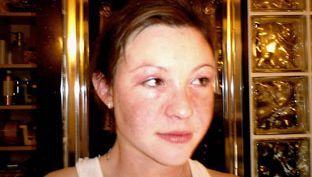
My boyfriend tells me I look beautiful just the way I am. But I don't care what he thinks. It's not about him. It's about me — how I think I look and how that makes me feel. And so, every morning, I go through the same ritual: I wash my face and moisturize, and then, to my boyfriend's dismay, I apply concealer. Not a lot. Just a dab. On the butterfly-shaped rash that covers the bridge of my nose and my cheeks.
I have lupus, a disease that's mysterious, erratic, and, for now, incurable. It happens when the immune system can't tell the difference between harmful foreign substances and its own healthy cells and tissues. As a result, it goes awry and begins to fight the body's own cells, causing inflammation. This means unpredictable bouts of joint pain, swelling, fatigue, fever, chest pain, and nausea. It also means you're very sensitive to the sun, and for 42 percent of lupus sufferers, you develop that telltale rash on your face, as well as blotchy welts on your shoulders and arms.
Terrible things can happen when lupus goes untreated — from kidney failure to heart attacks and even death. But for a girl growing up in bikini-clad beach towns all her life and trying to fit in, it's the disease's unpredictable effects on the skin, hair, and body shape that are especially exasperating.
I didn't realize I had lupus until seventh grade. (Lupus can occur at any age, though most sufferers I've met have been adults.) My family had just moved from Clearwater to Palm Beach, FL. Being the social girl that I am, I made new friends easily, and we'd have a great time at the beach. That ended when I went on a marine-biology trip to Key Largo for school. We'd been in the sun all afternoon on a boat when I noticed welts on my forearms. When I got home, my mother promptly took me to the dermatologist, who diagnosed lupus. After a second and third opinion, we finally accepted it.
To control the rashes and the inflammation that causes them, I had to go on the steroid prednisone. But its side effects on my skin, hair, and body were drastic. The drug causes a redistribution of body fat and fluid retention, so my hands puffed up, and I had this horrible moon face. I also continued to develop welts on my shoulders and arms, and my hair fell out in bizarre patterns — mainly on the top of my head and at the sides.
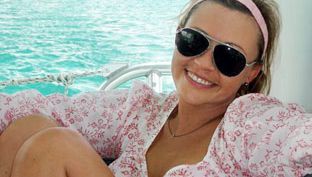
I grew up on boats in south Florida, and suddenly there I was, trapped indoors or harassed by my mother to wear hats and heavy sunscreen. Even though no one teased me at the time, I was irritated by all the questions people would ask when they saw the rashes or knew I had lupus: How did you get it? What does it feel like? I had little patience and got angry very easily. Whenever I find old photographs of myself, I throw them away. My mother gets furious. But I hate looking at them, not simply because my face was fat and my hair was thin, but because the photos captured a very scary time.
I've since managed to overcome my self-consciousness. Finding the right high school made a big difference. I enrolled in an art school, and the friends I made there looked past the moon face and rashes. When we hung out at the beach, they'd offer me an umbrella. When we had sleepovers, they would suggest going to bed early. (They knew I became easily fatigued.) And when I started dating, in 11th grade, it was never awkward or stressful because I'd only date people who were already my friends.
Stay In The Know
Marie Claire email subscribers get intel on fashion and beauty trends, hot-off-the-press celebrity news, and more. Sign up here.
As for my look, wigs are not my style, so when my hair became too brittle for extensions, I'd wear it in a ponytail. I'd color in the thinned spots with brown eyeshadow and add volume with a brown-colored hair powder from Bumble and Bumble. Depending on my mood or the occasion, I'd sometimes wear a bandanna or a baseball cap or a big floppy hat.
I'd started mixing my own makeup when I was 12, but art school further inspired me to see my face and body as a canvas. I'd take a makeup brush and mix foundations, concealers, and powders until I created the right shades and consistency to even out my complexion. To cover the rashes on my shoulders, I'd hunt for vintage scarves to wear over a sundress for nights out. I'd find sheer button-downs to cover up a two-piece at the beach. I also amassed quite a collection of sunglasses — the classic kind with big rectangular lenses, which balance out a round face. And I learned to embrace sunscreen.
The years that followed had their ups and downs — arthritis, brittle bones, and even chemotherapy (to help wean me off the prednisone). I had moved to Southern California for college by then to be near my doctor. At times I'd still get depressed, but eventually, I found solace in my makeup bag. I became increasingly obsessed with blending colors, scooping out different brands from their pods and smashing up the $80 variety with the $10 kind. Sometimes I used more powder, sometimes more liquid, until I concocted something I liked — a custom formula that camouflaged without feeling caked-on. Eventually, my mother suggested that I take my work to a lab and create a line. And so I did. I sold my first set of foundations, powders, and concealers last November, and now the line is available on the Web (nicolepaxson.com). I feel so proud when people send e-mails saying how much they love the textures, how my formulas have helped mask imperfections, from zits to butterfly rashes like mine.
Now, at 25, my symptoms have subsided a bit. I'm off chemo, and I take only small doses of prednisone. I still need four pills a day to keep the condition in check, but that's a miracle compared to the 14 or so I needed just a few years ago. Lupus, along with the pills I take to manage it, has drastically affected my looks and my feelings about beauty in general. Sure, its effects made me self-conscious, but ultimately I realized that I don't have to feel that way. My looks are something I can actively affect, enhance, and change — not simply to fit in, but to help people notice me for me and not my physical differences. To me, taking control of my looks — owning them — gives me confidence and comfort.
It has been a long journey to get to this point, but I feel lucky. And sometimes, when I put on the makeup I made myself and a great pair of sunglasses, I agree with my boyfriend: I look beautiful.
-
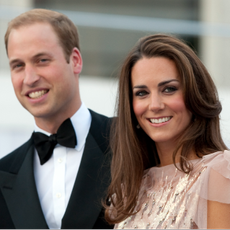 Prince William Single-Handedly Planned His and Kate Middleton’s Romantic Honeymoon
Prince William Single-Handedly Planned His and Kate Middleton’s Romantic HoneymoonKate had no idea where they were headed on their two week luxurious break from reality until after their 2011 wedding.
By Rachel Burchfield Published
-
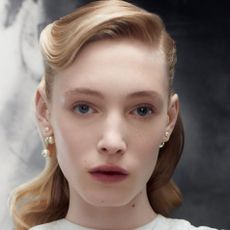 Bitten Lips Took Center Stage at Dior Fall 2024 Show
Bitten Lips Took Center Stage at Dior Fall 2024 ShowModels at the Dior Fall 2024 show paired bitten lips with bare skin, a beauty trend that will take precedence this season.
By Deena Campbell Published
-
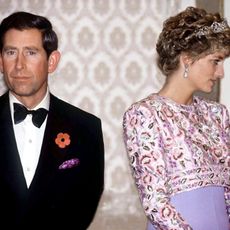 Princess Diana Revealed to a Royal Author the Real Reason Why Her Marriage to Prince Charles Ended Not Long Before She Died in 1997
Princess Diana Revealed to a Royal Author the Real Reason Why Her Marriage to Prince Charles Ended Not Long Before She Died in 1997And no, it apparently wasn’t Camilla Parker-Bowles.
By Rachel Burchfield Published
-
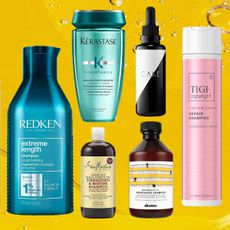 The 32 Best Hair Growth Shampoos of 2024, According to Experts
The 32 Best Hair Growth Shampoos of 2024, According to ExpertsRapunzel hair, coming right up.
By Gabrielle Ulubay Published
-
 The 20 Best Hair Masks for Damaged Hair, According to Experts and Editors
The 20 Best Hair Masks for Damaged Hair, According to Experts and EditorsHealthy strands, here we come!
By Gabrielle Ulubay Last updated
-
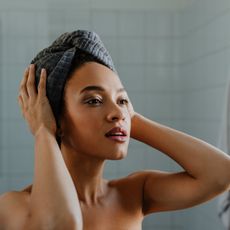 How Often You Should Wash Your Hair, According To Experts
How Often You Should Wash Your Hair, According To ExpertsKeep it fresh, my friends.
By Gabrielle Ulubay Published
-
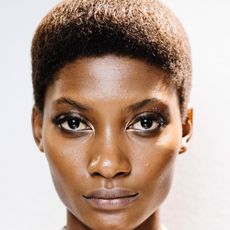 The 11 Best Magnetic Lashes of 2023
The 11 Best Magnetic Lashes of 2023Go ahead and kiss your messy lash glue goodbye.
By Hana Hong Published
-
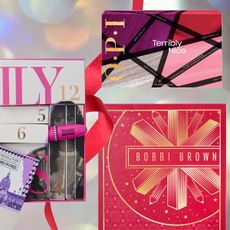 Beauty Advent Calendars Make the Perfect Holiday Gift
Beauty Advent Calendars Make the Perfect Holiday GiftThe gift that keeps on giving.
By Julia Marzovilla Last updated
-
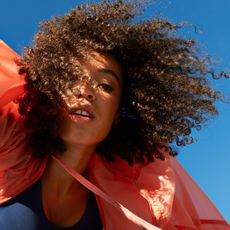 The 18 Best Natural Hair Products in 2023
The 18 Best Natural Hair Products in 2023Remember: Your curls are your crown.
By Gabrielle Ulubay Published
-
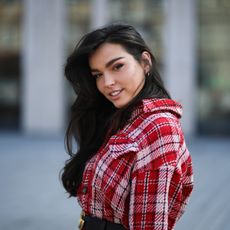 The 9 Best Hot Rollers for the Curls of Your Dreams
The 9 Best Hot Rollers for the Curls of Your DreamsThis is how we roll.
By Samantha Holender Published
-
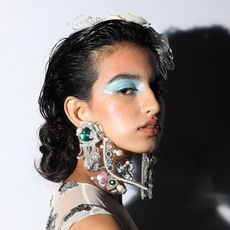 The 12 Best Cream Eyeshadows, According to Makeup Artists
The 12 Best Cream Eyeshadows, According to Makeup ArtistsThe best part? They’re so easy to apply.
By Samantha Holender Published